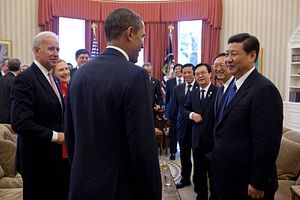The China-U.S. relationship is undoubtedly one of the most important and unique bilateral relationships in contemporary world politics. Hence, any change or even fine tuning of the Sino-U.S. relationship can result in substantial consequences for nearby countries or even the world. The importance of this relationship comes from the size of these two great powers, as well as their political influence, economic power, and military capacity.
The uniqueness of the China-U.S. relationship primarily comes from the differences that exist between China and the U.S. in almost all aspects. Regarding these differences, especially when it comes political ideology and values, China’s position has been very clear: “seek common ground while reserving differences.” However, the U.S. remains keen to use its still dominant leadership role in world politics to promote so-called universal values or principles such as Western-style democracy. This cognitive divergence is a fundamental cause for the lack of trust and thus the antagonism between these two great powers, a situation which can be described as “abnormal normality.”
When it comes to U.S.-China relations on a global scale, there are three main possibilities for the future. First, China could refuse to completely join and merge into the U.S.-led system, instead trying to create a new regional or even global system. Second, China could merge entirely into the dominant system and passively adopt U.S. leadership. Third, China could join the U.S.-led world system but take the initiative to change and reform the system until China seizes leadership from the inside.
At this point, it’s not clear what scenario is the most likely to play out. Without keeping an open-minded attitude and approach, and more importantly continuously seeking and consolidating consensus on various issues (especially trans-national problems), Sino-U.S. relations will go through a long and exhausting period full of ambiguity and uncertainty. Against this backdrop, China’s suggestion of constructing a “new type of great power relations” is an unprecedented attempt to break out of the framework of conventional theories and stereotypes in world politics.
When defining “new type,” the key point is to go beyond assumptions about the doomed fate of great powers. With the help of subjective analysis of the contemporary world situation, we can come to different conclusions than those suggested by historical empiricism. There are two critically important factors to support the possibility of a “new type” of relationship: a changing understanding of power (including soft power) and the challenges brought by global and cross-border issues. Both these factors show us that national interests can be secured and realized through bilateral and multilateral negotiation and cooperation, in spite of political and ideological differences. This is the only way for China and the U.S. to escape the historical precedent of hard confrontation.
What’s more, the above two factors have been reinforced by another equally important variable: China’s expanding economic power. Put together, the three factors have created a background for these two competing great powers that is quite different from previous historical scenarios.
There remains a serious problem, however. To some extent, the U.S. regards China’s suggestion of constructing a “new type of great power relations” as China’s way of evading its competition with the United States. Some in the U.S. believe that Beijing has put forward this proposal as a defensive tactic, a way of counteracting pressure from the U.S. at a time when China still does not have the upper hand. Hence, without a more comprehensive and solid consensus on the true intention and strategic goals of constructing new type of great power relations, this proposal could become just another source for distrust between China and the United States.

































